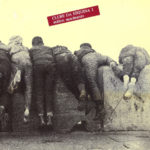
At least for me, some of the most interesting albums are the ones released by artists long after their much more lauded work. I say this, because these deep cuts usually detail a bit more history and show the weather of age a bit more clearly than earlier works. This is my thinking: what happens when the original dreams and aspirations that propelled us at the beginning start to evolve/devolve with the reality of passing time? Do we still aim for the same spirit or does something truly change. Let no one tell you otherwise, Milton Nascimento’s & Lo Borges’s Clube Da Esquina rightfully earns its stripes as one of the best Brazilian albums ever. And, if you’re being honest with yourself, one of the best released anywhere on this planet…but how (or why) on Earth would you exactly top something like that? Why would you want to create a sequel that people could easily judge you against?

1978 was a weird time for all of the cast in the second version of Clube Da Esquina. Successful careers by many of its original members – Lo Borges, Toquinho, Beto Guedes, Nelson Angelo – had been crushingly stalled by the ridiculous censorship rules and restrictions placed by the reigning military junta. When Wayne Shorter visited Brazil to enlist Milton’s iconic voice for his own Native Dancer it always seemed that all his like minded brethren needed was one of them to successfully “make it”, in the English-speaking world, to open doors for everyone else. Milton tried to parry his star-making turn by releasing one of his most personal and audacious musical statements: Geraes. The first release to truly focus on that vastly different Brazilian region that he hailed from, where music seemed to be noticeably more languid, dreamy, and melancholic was something for his Brazilian fans to sink their teeth to before he made his attempt to crossover.
When 1976’s Milton came out on A&M, in the U.S. and elsewhere (a first for Milton) it was supposed to be the album that would lift all boats. Recorded in California, sung almost entirely in English, featuring a whole slew of re-recorded prime cuts that got Milton where he was today, somehow it went nowhere. Perhaps because of the increasing segregation of mainstream music – soul music for some, rock music for the others – there was little room for his kind of inbetween music that straddled jazz, pop, folk, and latin music.
When he arrived back in Brazil it was his struggle to make it that placed Milton in a noticeable funk. Much like his compatriot Lo Borges, so much time trying to spend pleasing others, put the unhappy burden of compromise on their already heavy creative loads. That’s why Clube Da Esquina 2 is such a welcome and surprising listen. It’s the sound of these two icons accepting new voices and realizing that once again Minas Gerais has a special sound that others can buy into.

Although conceived as a Milton Nascimento album, Clube Da Esquina 2 is a musical treatise on new territories that a lot of the people who contributed to it could take. The highlights are plenty. Work from Flavio Venturini, Lo Borges, and Beto Guedes showing truly fascinating, new musical directions they would take Brazilian music into. The more surprising thing is just how everyone else – Chico Buarque, Elis Regina, Cesar Camargo Maria, and Joao Donato – artists who had been winding through longer career paths did their best to update and find worth in the original Minas Geraes sound.
Everything just sounds as warm, inviting, and lived-in as can be. When you hear Lo Borges describe a life of Brazilian displacement in “Ruas da Cidade”, one filled with disappointing encroachment by industry and road into once verdant communities, it’s met with music matching all levels of meaning found in a waking dream. Now with time and experience, it appears everyone was the wiser to pitch for more reflection in tone. So, when you get to the joyful bits like “Maria, Maria” proclaiming faith in hope, you know it’s something to truly earned and believed.
Back when they were younger, it seemed the sky was the limit. Now, it seemed, small victories could mean something far greater than larger ones. At least for today, you’ll be hard pressed find a more meditative album on the power of strength through unity and on time being that final balance on certain despairs.
